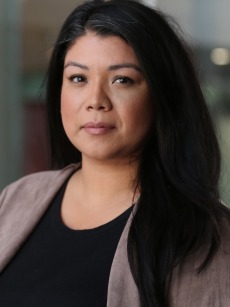
Daisy Vargas (PhD -History, University of California Riverside; MA- Religious Studies, University of Denver) specializes in Catholicism in the Americas; race, ethnicity, religion in the United States; Latina/o/x religion; and material religion. Her current project traces the history of Mexican religion, race, and the law from the nineteenth century into the contemporary moment, positioning current legal debates about Mexican religion within a larger history of anti-Mexican and anti-Catholic attitudes in the United States. Vargas' interests include museum curatorial and advisory work.
Vargas is co-chair of the Religions in the Latina/o Americas unit and steering committee member of the Catholic Studies unit for the American Academy of Religion, curator of the American Religion journal’s “Sources,” and board member of Catholic Re-Visions (Political Theology Network.)
Selected Publications
- "Spectral Comrades and Comandantes: Latinx Hauntology and the Day of the Dead in Orange County, CA" with Jennifer Scheper Hughes in Religion in the Américas, ed. Christopher D. Tirres and Jessica Delgado, University of New Mexico Press (2025)
- “Latinx Catholicism in the U.S.” in Bloomsbury Religion in North America, ed. Lloyd D. Barba (2023)
- “Religion: Here and Now,” in Religion in the American West: A Companion to the Exhibit Acts of Faith, ed. Jessica Nelson, University of New Mexico Press (2023)
- “Latinos/as/x, Pilgrimage, and Embodiment,” in the Oxford Handbook of Latinx/o/a Christianities, ed. Kristy Nabhan-Warren. Oxford University Press (2022)
- “Is Anti-Catholicism Relevant Where and When We Are?” Journal of American Catholic Studies (2022)
Selected Online Contributions
- “Racializing and Establishing Catholic Heterodoxy: Traffic Stops as Theological Spaces,” Political Theology Network, April 2022.
- “La Llorona Visits the American Academy of Religion: A Tribute to Luis De. León, ” The Revealer: A Review of Religion and Media, November 2019
- Republished in The God Beat: What Journalists Have to Say About Faith and Why it Matters (Broadleaf, 2021)
- "Traveling Image of the Holy Child of Atocha (Santo Niño de Atocha), Plateros, Mexico." with Jennifer Scheper Hughes, Conversations: An Online Journal of the Center for the Study of Material and Visual Cultures of Religion, 2014
Selected Awards and Fellowships
- National Endowment for the Humanities, "Engaging Latinx Art: Methodological and Pedagogical Approaches,” Summer Institute Fellow (2022)
- Lived Religion in the Digital Age and Museum of Contemporary Religious Art, Public Humanities Fellow (2021)
- Young Scholar in American Religion, Center for the Study of Religion and American Culture (2019-2021)
- Center for Religion Cities, Summer Research Grant (2019)
- Charlotte W. Newcombe Fellow (2017-2018)
- Young Scholar in Latino Studies, Institute for Latino Studies (2017)
Museum Related Work
- Museum Advisory Committee, Engaging Lived Religion in the 21st Century Museum, Fowler Museum at UCLA, (2018-present)
- Co-curator "Pertenencias: Recuperando lo sagrado en objetos fronterizos / Belongings: Recovering the Sacred in Objects from the Border" photographic exhibition, Museum of Contemporary Religious Art, Saint Louis University (2021)
- Educational Programming, Alinka Echeverría: Faith and Vision photographic exhibition, California Museum of Photography (2014-2015)

